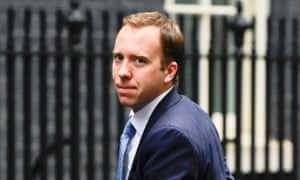
Matthew Hancock, the media minister, needs to take steps to avoid a conflict of interest on press regulation after George Osborne, his former boss, took a job as the editor of the Evening Standard, Labour said on Tuesday.
Tom Watson, the Labour deputy leader and shadow culture secretary, wrote to Hancock asking him to recuse himself from any policy discussions about the Evening Standard or its commercial interests given his history of working as Osborne’s chief of staff.
Alternatively, Hancock could think about asking Theresa May to move him to another job, the Labour MP said.
“Your elevation to ministerial office and subsequent promotions, while no doubt attributable in part to your own talents, were often interpreted also as moves by George Osborne as chancellor to consolidate his power base in government,” Watson wrote. “There is no secret and no shame in a Conservative MP being a loyal ally of his former boss and powerful patron.
“However, as a minister of state at the Department for Culture, Media and Sport you now have ministerial responsibility for areas in which George Osborne and his new employer have a commercial interest.
“As editor of the London Evening Standard, Mr Osborne can be expected to seek to influence ministers on media policy, in line with his views and the views of his paper’s proprietor, Mr Alexander Lebedev, both in the pages of the newspaper and in meetings with ministers. You would be one of the chief targets of any such attempts to influence media policy.”
In separate parliamentary questions, Watson is also pressing the prime minister to be clear whether Osborne will have access to privy council papers, attend full privy council meetings and receive sensitive information on privy counsellor terms while he is editor of the newspaper. Privy counsellors are bound by oath to keep matters relating to meetings of the body secret and can therefore have confidential documents shared with them on “privy council terms”.
Watson wrote to Hancock amid deep concern within Labour and some Conservative MPs about Osborne’s decision to take a job that could cause a conflict between his interests as an MP and as a newspaper editor.
On Monday, Osborne defended his decision to take the job, alongside his £650,000 a year advisory position for BlackRock, lucrative speeches to financial institutions, a Henry Kissinger Fellowship and chairmanship of the Northern Powerhouse Partnership while also remaining an MP.
He told the House of Commons that parliament benefited from members bringing in experience of different sectors alongside their constituency work. He was responding to an urgent question from Labour’s election coordinator, Andrew Gwynne, over a potential conflict of interest.
“I thought it was important to be here, though unfortunately we have missed the deadline of the Evening Standard,” the former chancellor joked in the House of Commons, to a mixture of cheers and jeers. “In my view, Mr Speaker, this parliament is enhanced when we have people from all walks of life and different experience in the debate and when people who have held senior ministerial office continue to contribute to the debate,” he said.
However, Osborne added that he would “listen to what my colleagues have to say in this debate”.
The former chancellor is still awaiting the outcome of his application for approval from the advisory committee on business appointments, which is now actively considering a call for him to delay or decline the role.
He appears to have irritated the ethics watchdog, which considers whether new jobs for former ministers could present a conflict of interest, by announcing his appointment before they were given time to review any potential conflict with his duties as MP and his former role at the Treasury.
The committee is usually given at least a month to carry out research into what contacts a former minister had in his or her department that could constitute a conflict of interest in any new role, but it is understood that some members of the committee were informed less than an hour before Osborne’s appointment was made public. They are now expected to give advice within two weeks.
After defending his new role in the Commons on Monday, Osborne wrote an open letter to his constituents published by the Knutsford
Guardian, the local paper in his seat, saying there was a “long tradition of politics and journalism mixing”.
He pointed to examples of work he said he had done in his constituency this week, including helping Cheshire schools “get a fairer deal out of the proposed new funding formula”, opening a new road, speaking at a fundraising dinner and holding his regular constituency surgery. “It is all in a week’s work as your MP,” he wrote.
Osborne also said he was still supporting the Northern Powerhouse in Manchester this week. “I believe this diversity of experience makes our parliament stronger. I hope you agree and I look forward to continuing to hear what you have to say and to work with you on the problems we face,” he added.
Any local Conservative members will have a chance to complain about Osborne’s decision at the annual meeting of Tatton Conservatives on Friday. Osborne is also the subject of a petition against his new job signed by 145,000 people, started by his constituent, Diana Simkins.